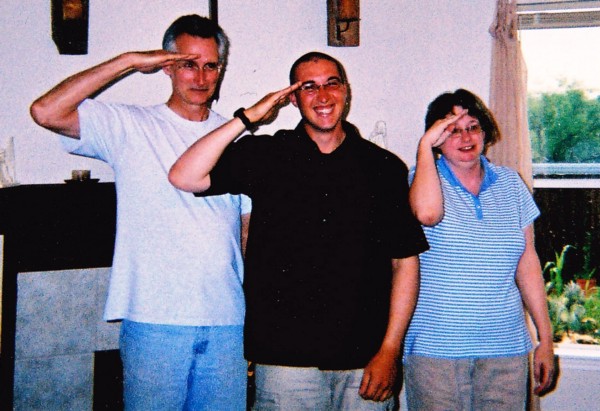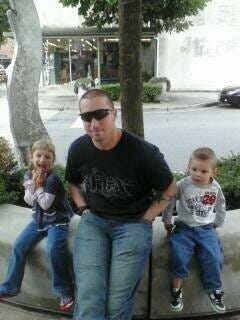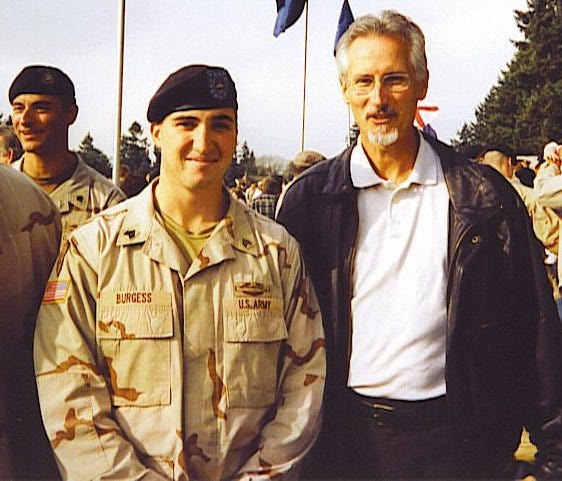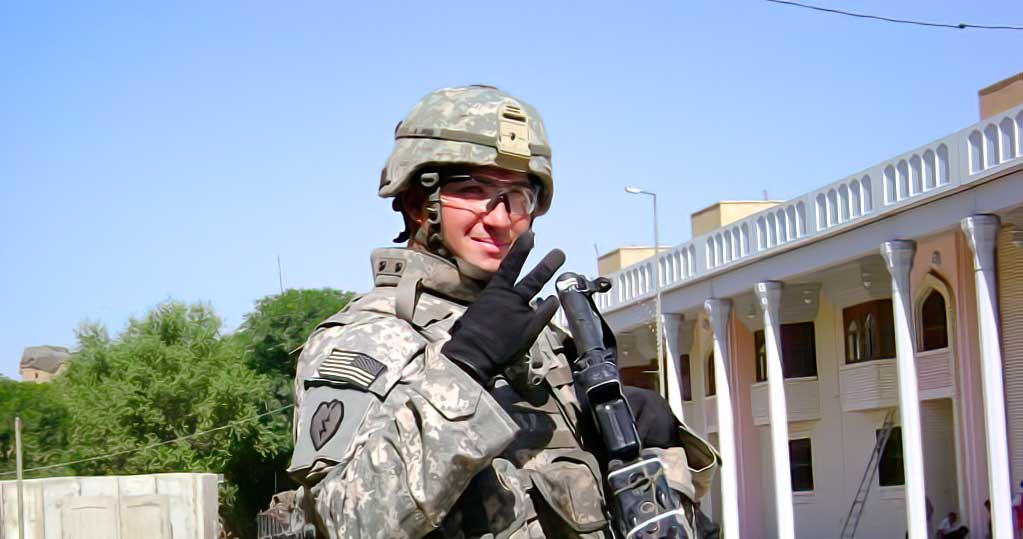Bryan Burgess was killed in action during a 2011 deployment to Afghanistan just 16 days before he was scheduled to return home — a few weeks shy of his 30th birthday.
Telling and re-telling the story of his son’s life and sacrifice pulled Terry Burgess from deep depression
In the early morning hours before Terry Burgess learned that his son Bryan had been killed in action in Afghanistan, he had a vivid dream.
“We’re in this outdoor movie theater, me and Bryan,” Terry remembers. “He’s on the movie screen in his combat uniform and there’s a glass coffin beside him. He steps into the coffin and, when he lays down, he turns into my little boy Bryan, like seven or eight years old. Then little boy Bryan steps out of the coffin and becomes Bryan the soldier again. He gives me a salute and then the movie screen just goes — bam — white. That’s when I woke up to the phone ringing.”
The call was from Bryan’s wife, Tiffany, with the news that Bryan was gone. Terry and his wife Beth would receive an official notification through a visit from Army officers later that morning.

The next days and weeks were a whirlwind of events honoring Bryan. They met with their Casualty Assistance Officer from the Army, whose job it was to handle paperwork, and anything else they needed for a year.
Soon the cards and letters slowed, then stopped coming, Terry said. “The casseroles stop, people stop checking on you, and you’re just isolated.”
“After his funeral, after we got home from all the ceremonies, I just sank. I just literally sank. I was unemployed, I was laid off, I had no purpose,” he said.
Terry’s wife Beth was afraid for him. “He would just spend days and days and days just sitting… not talking, not eating, just sitting. While I’m at work, I’m terrified that I’m going to come home, and that he’s going to be gone, and I don’t know what to do about that….it was a very, very scary time,” she said.
Beth started looking for organizations that could help Gold Star parents and couldn’t find much. “There was a lot out there for the widows — understandably — and for kids and moms. But there was almost nothing for dads,” Beth said.
A documentary film changes everything
More than a year after Bryan’s death, the producers of a documentary called “The Hornet’s Nest” contacted Terry and Beth. The film used footage collected by an embedded journalist who traveled with Bryan’s unit in Afghanistan. Helmet and hand-held cameras captured the 360-degree firefight with the Taliban that claimed Bryan’s life, and included an interview with Bryan, talking about how much he missed his children. The film’s producers asked Terry and Beth to screen a rough cut of the film, hoping to earn the approval of the Gold Star families before releasing it to the public.
“Beth got me out of bed and got me cleaned up,” Terry said. They traveled to Dallas to watch it. “And there was Bryan in his army uniform on screen. It was a slap in the face for me.”
Terry felt he suddenly understood what his dream on the morning of Bryan’s death had been about. “I thought, ‘that’s what Bryan was trying to tell me,” says Terry. “I can’t just spend my life mourning the loss of my little boy. The innocent little boy had to die when Bryan became a soldier. Now he wants me to salute him back however I can.”
Bryan’s story reflects others’ combat experience
For over a year, Terry and Beth toured with the film, visiting military bases and colleges and other venues. Every time they watch it, “it rips us apart,” Terry said. “But I tell people that it saved my life.”
Terry, Beth and the other families involved in the film were asked to speak at each screening. “It was a lot of holding hands and squeezing hands… a lot of tears,” Terry said. “It was kind of cathartic for us because we got to tell Bryan’s story to so many people who wouldn’t have heard it otherwise.”

The screenings also gave them an opportunity to help educate the public about the ways that combat changes the lives of the veterans who survive.
“Bryan changed the very first time he went to Iraq and came home. He was a completely different person. And it was very hard to connect with him,” Beth said. “A lot of what we did was just to help everybody understand everything that the guys were going through when they came home, because they all carry a huge amount of survivor’s guilt.
Reaching other Gold Star fathers
Last year, Terry published a memoir about the family’s experience of losing Bryan titled When Our Blue Star Turned Gold. It’s given him a broader audience to continue to tell Bryan’s story and reach out to other parents, especially fathers.

New speaking engagements and publicity for Terry’s book, including an interview on NBC’s Today show, have helped to fill the annual retreat he and Beth created for Gold Star parents. They aim to keep making room for any parent in need.
“We tell Bryan’s story,” Beth said. “And we help as many people as we can to tell their stories.”
America salutes Terry and Beth
As the nation searches for ways to recognize another Memorial Day weekend, they can draw inspiration from a 2011 American Airlines flight. Following Bryan’s funeral, Terry and Beth boarded a flight to head home. They were crouched in the very last row of the plane, emotionally exhausted. The Casualty Assistance Officer, who had been with Terry and Beth since Bryan’s death notification, contacted the airlines.
Touched by their sacrifice and Bryan’s service, the pilot took time to meet the Burgess’. Sitting across Terry and taking Beth’s hands he said, “I want you all to know how very, very sorry I am for your loss. I’m fixing to be deployed to Afghanistan myself.” They shared stories of Bryan and appreciated the compassion and comradery.
As the plane approached its destination, the pilot announced, “We have parents of a fallen soldier on the plane. I would appreciate it if everyone would stay seated and let them disembark first. Let them go home.”
With Beth carrying their newly received flag in her arms, fellow passengers stood still, applauding them as they disembarked. As they passed through first class, a veteran stood up and saluted Terry and Beth.
In that moment, America stood with Terry and Beth. They were not alone.
*Read more in the story of how Bryan’s dad recognized his son’s caring, protective nature early and continues to honor him: “A Legacy of Protecting Others.”

